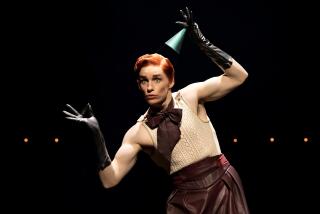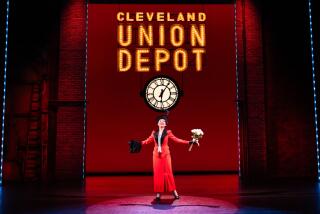Review: ‘Kiss Me, Kate’ from Roundabout Theatre has more showmanship than chemistry
The new Roundabout Theatre Company production of “Kiss Me, Kate” at Studio 54 has nearly everything that’s needed for a top-drawer revival of this Cole Porter classic.
First and foremost, the show stars Broadway divinity Kelli O’Hara, who endows whatever musical role she’s playing with coloratura splendor. Muscularly directed by Scott Ellis, the production showcases Warren Carlyle’s exhilarating choreography, which looks ready to compete in a new category at the next Summer Olympics, with tap-dancing Corbin Bleu in line for a gold medal.
Some strategic adjustments have been made to this backstage musical, based on Shakespeare’s retrograde comedy “The Taming of the Shrew,” so that Porter’s lyrics and Sam and Bella Spewack’s book don’t give offense. The song “I Am Ashamed That Women Are So Simple” is now “I Am Ashamed That People Are So Simple,” one of many minor tweaks designed to bring the show (and even Shakespeare) into alignment with our more conscientious era of gender politics.
No one is likely to go home feeling outraged or under-entertained. Yet some essential human chemistry is missing. Ellis works strenuously to conceal this deficiency with daredevil virtuosity. But the lack of emotional suppleness grows only more noticeable. By the end, I was wondering why the characters seemed as disconnected as a company of actors on the first day of rehearsal.
‘BE MORE CHILL’: Adolescent angst of ‘Evan Hansen’ gets a wacky (and loud) A.I. twist »
O’Hara is renowned for her compassionate delicacy. When she makes her entrance in “Kiss Me, Kate,” she comes swathed in the same palpable hush she wore with poignant grace in “South Pacific” and “The King and I.” But this isn’t a Rodgers & Hammerstein universe. The air is thinner, the comedy more brittle.
O’Hara is many things — a radiant stage presence, a singer who might be enrapturing audiences in opera halls instead of in Broadway houses. But she’s not a natural comedian. The role of Lilli Vanessi, the actress playing man-hating Katharine in the new musical version of Shakespeare’s “Shrew” that’s having a tryout in Baltimore, takes O’Hara out of her comfort zone. When the farce turns physical, she rises to the challenge with some good hard kicks. But she doesn’t have enough opportunities to do what she does best: turn wistfulness into song.
Will Chase (Luke Wheeler on ABC’s “Nashville”) plays Fred Graham, the writer, producer and hammy star of this shaky Shakespearean extravaganza. He’s also Lilli’s egotistical ex-husband. As Fred and Lilli’s backstage relationship reopens old wounds, the anger between their characters, wife-taming Petruchio and truculently independent Kate, spins wildly out of control.
The fighting between Lilli/Kate and Fred/Petruchio seems almost certain to leave bruises — on O’Hara and Chase. Ellis’ staging doesn’t pull any punches. At one point, O’Hara is flipped upside-down in a maneuver designed to make a sexual joke that had me worried about the safety of O’Hara’s head and neck. This battle of the sexes is evenly matched with low blows, but the hostilities seem more authentic than the attraction fueling the combatants.
Chase has the pencil mustache and cocky aloofness of a knockoff Clark Gable. The roguery and raillery are in place, and he has a pleasing way with a song, but his instincts for clowning undermine his suavity. Chase and O’Hara seem no more destined to be together as performers than Fred and Lilli seem fated to be reunited as a theater couple.
‘MOCKINGBIRD’: At 78, Dakin Matthews strikes Broadway gold as the judge »
The deepest attachment any of the characters has in this revival is to the theater itself.
“Kiss Me, Kate” is a book musical with an impressive array of theatrical layers, but it retains some of the old variety show impulses that were the stock-in-trade of the American musical before Rodgers & Hammerstein demonstrated the way song and story could be comprehensively integrated. For the full charm of Porter’s 1948 masterpiece to take effect, the bawdy shtick must be ballasted with romantic feeling.
That sense of seductive inevitability, which was ever-present in the 1999 Broadway revival with Brian Stokes Mitchell and Marin Mazzie, is roughhoused out of Ellis’ production. Cynicism and sex fill the void whenever the staging takes a break from its sensational showmanship.
Porter’s naughtiness isn’t allowed to leave much to the imagination. If the dancing during “Tom, Dick, or Harry” were any more phallic, this Roundabout revival might find itself shut down on indecency charges. Theatergoers today seem to find the ribaldry bracing. I have no complaints, but there are times when Porter’s cleverness needs a lighter touch.
BABYLON: Operas in Berlin and Hamburg go all in with Trump and an immigration crisis »
When John Pankow and Lance Coadie Williams, as the two goons who get mixed up with the company while trying to collect a gambling debt, perform “Brush Up Your Shakespeare,” the impish word play pounds rather than tickles. The two characters keep thinking up stanzas, but their heavy tread doesn’t allow for giggly surprise.
No one could blame the cast for collapsing in a muddle after the rousing rendition of “Too Darn Hot” that stops the show early on in the second act. The hard-charging choreography sets out to wow the audience and breathlessly succeeds. As good-time gambling Bill Calhoun, Bleu brings down the house with some tap-dancing jazz in “Bianca.” But if there’s any real feeling between Bill and Stephanie Styles’ Lois Lane, the floozy whose friendliness helped her land the role of Bianca, it escaped my notice.
The deepest attachment any of the characters has in this revival is to the theater itself. Ellis romanticizes the backstage world far more than he romanticizes any of the couples. From the ghost light throwing off its lonely illumination to the way O’Hara takes a female company member’s hand during an ensemble number, the show expends all its sentimentality on a profession that regularly brings its members into provisional intimacy, only to dissolve these ties once it’s time to move on to the next gig.
Lilli is tempted to marry Gen. Harrison Howell (a rather wooden Terence Archie) to escape the theatrical roller coaster with Fred. The script, however, has her follow her heart and return to her leading man. But there’s no question that in Ellis’ production, it’s the tatty allure of showbiz that has Lilli hooked.
More to Read
The biggest entertainment stories
Get our big stories about Hollywood, film, television, music, arts, culture and more right in your inbox as soon as they publish.
You may occasionally receive promotional content from the Los Angeles Times.







